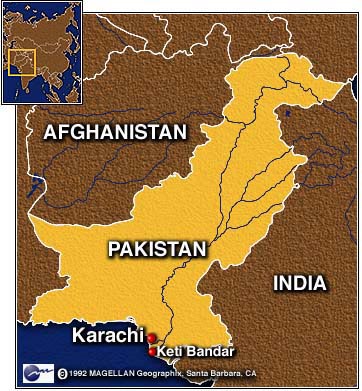Pakistan's poor go hungry amid food shortages
 Karachi - Sukena, a middle-aged mother of two girls, argued with a shopkeeper as she reached her hands into the pockets of her burqa and counted money. All she had was 25 rupees (35 cents), barely enough to buy bread but no milk in the port city of Karachi.
Karachi - Sukena, a middle-aged mother of two girls, argued with a shopkeeper as she reached her hands into the pockets of her burqa and counted money. All she had was 25 rupees (35 cents), barely enough to buy bread but no milk in the port city of Karachi.
"Just a year ago, I could easily afford roti and some milk with this much money, but not anymore," she said with tears in her eyes.
Sukena, a pregnant house cleaner whose husband is a drug addict and an auto rickshaw driver, is among the majority of 170 million Pakistanis living on the verge of poverty, earning barely 2 dollars a day.
They are now also plagued by the rampant scarcity of rice and wheat flour, which is used to make the staple roti, a round, flat bread. In addition, inflation hit its highest level in more than 30 years last month as consumer prices rose 17.21 per cent over the same month a year earlier. Food prices rose 25.5 per cent.
"The food shortage is so severe that it could endanger our national unity and federation," warned Hari Ram Lohano, a leading food economist at the Social Policy and Development Centre, a leading think tank.
Food riots and skirmishes have already become a routine affair across Pakistan since the beginning of the year.
Among the worst-off areas are restive North-West Frontier Province and western Balochistan province, where the price of a 100-kilogram bag of wheat flour has now reached 5,000 rupees, compared with 1,300 rupees last year, making it impossible for many to buy the most basic food.
"In some areas, people have been reduced to eating rotten bread crust after softening it in water," said Akram Shah, secretary general of Balochistan's Pukhttonkwa Milli Awami Party. "For that, too, they have to struggle to buy it. Believe me our people are dying."
Thousands line up everyday in Peshawar, the North-West Frontier Province capital, and on its outskirts outside state-run grocery stores to buy cheaper wheat flour. After hours of waiting, some people get only two scoops, barely sufficient to meet a family's bread needs for one meal.
Many blame the previous government led by President Pervez Musharraf's political allies for the food crisis.
It miscalculated wheat harvest estimates last year and permitted the export of 1.6 million tons of the staple, believing there would be a surplus after the usual consumption of around 20 million tons. However, a shortage resulted, causing the price spike.
"We exported wheat at 200 dollars a ton and are now importing it at 400 dollars a ton," said Nawaz Sharif, a former prime minister and leader of the Muslim League
(Nawaz), which was part of the coalition that routed Musharraf's supporters in February 18 elections.
"Who made billions of rupees in commission in this export and import of wheat?" he asked in a television interview this week, indirectly accusing the former government of corruption.
Pakistan is currently harvesting wheat, but some surveys indicated the crop would be poor because of a prolonged winter, delays by the government in announcing subsidized prices and a water shortage.
"If things continue like this, the country will plunge into an uncontrollable situation," Shah said.
The new government announced recently that it would import 2.5 million tons of wheat to boost reserves, but the move does little to help its people suffering now.
Humping a 5-kilogram sack of wheat in the higgledy-piggledy streets of Karachi's Jodia Bazar, a labyrinth of narrow and open-front shops where commodities are sold in bulk, Mohammad Tahir, a taxi driver, said he could not afford to send his children to school.
"My young one is very brilliant and a very good student," Tahir said. "He just passed his grade two, but I cannot afford his fees to send him to a school in grade three. I have to make a choice between food and education."
For others, options are even fewer.
"My husband has told me that if I bear a third girl, he would sell her for 50,000 rupees," Sukena said.
"I don't want that to happen, but I have nothing in my control," she said. (dpa)